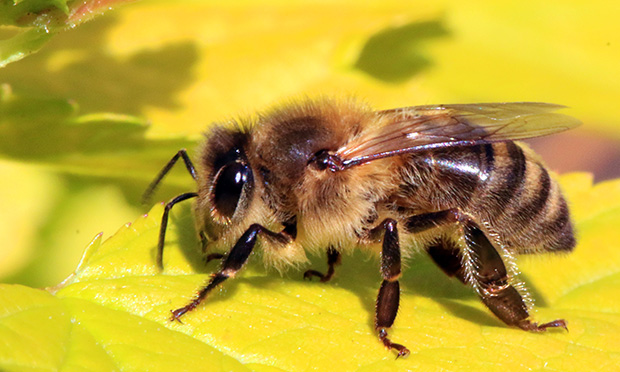‘Glyphosate obliterates insects’: Parents urge Islington Council to outlaw harmful weedkiller

Glyphosate has been shown to damage bees
Families want the use of a weedkiller to be outlawed on council land over concerns about its impact on wildlife.
Rachael Swynnerton from Islington Clean Air Parents (ICAP) is urging the council to stop using glyphosate.
She said it “obliterates insects” and “kills everything that is green”.
“Glyphosate kills weeds that insects and other wildlife depend on,” she added.
She says it use is “contrary” to Islington’s biodiversity action plan.
In 2020, the council passed a motion to phase out glyphosate but Swynnerton said ICAP “does not believe the opt-out scheme is operating effectively” and wants an opt-in scheme instead.
The weedkiller is a broad spectrum herbicide, which means it does not kill a specific plant but most broad leafed plants in the area where it is used.
It is absorbed through leaves, rather than taken up through plant roots.
Swynnerton appealed to council bosses to follow neighbouring Hackney, which is trialing glyphosate-free areas and cutting down on its use of the chemical.
Studies have shown glyphosate can damage bees.
Several countries including Columbia, Sri Lanka, the Netherlands and France have bans or partial bans in place. Germany plans to phase out its use.
The EU renewed the approval of glyphosate for five years until 2022, although the UK expressed concerns.
Swynnerton called for the council to only use it in exceptional circumstances such as the control of Japanese knotweed, which is listed by the government as an invasive species.
This would mean it could “ensure pavements are safe” and meet its commitment to the Transport For London equal pavement pledge.
Glyphosate was a major factor in the decline of orange Monarch butterflies, which are mainly found in North America, Australia and New Zealand, Swynnerton said.
“It also harms bees, reducing their resistance to disease.”
She added: “We are asking the council to reconsider its policy in the light of protecting biodiversity.”
She continued: “Weeds are what we call them but they are wildflowers and support insects. If we destroy bees, we destroy food sources.”
The council said its focus is tackling weeds “in the most environmentally-friendly way possible, including by using sweeping, hand weeding, bark mulching, and, where there is no practical alternative, using herbicide”.
A spokesperson said: “We have to control weeds in order to prevent issues such as: damage to pavements, hindrance of wheelchairs, trip hazards and drainage channels becoming clogged.”
They added: “We are passionate about protecting our borough’s rich biodiversity and seek to use as little herbicide as possible. We are using new systems of spraying on the public highways which has ensured a 60 per cent reduction in the amount of glyphosate used, through targeted treatment of weeds.”
Residents are also encouraged to remove weeds in their own areas, cutting down on “the need for herbicides such as glyphosate”.
Participating streets include Jackson Road in Holloway, Mayton Street and Monsell Road in Finsbury Park, and Dewey Road and Denmark Grove near Angel.
Residents in Mercers Road and Yerbury Road in Tufnell Park also look after their streets.
People are urged to get in touch and join the campaign.
The council spokesperson said: “We want to reduce our use of herbicide such as glyphosate still further and, as stated in our Biodiversity Action Plan, we continue to review the use of pesticides and herbicides in Islington.”
